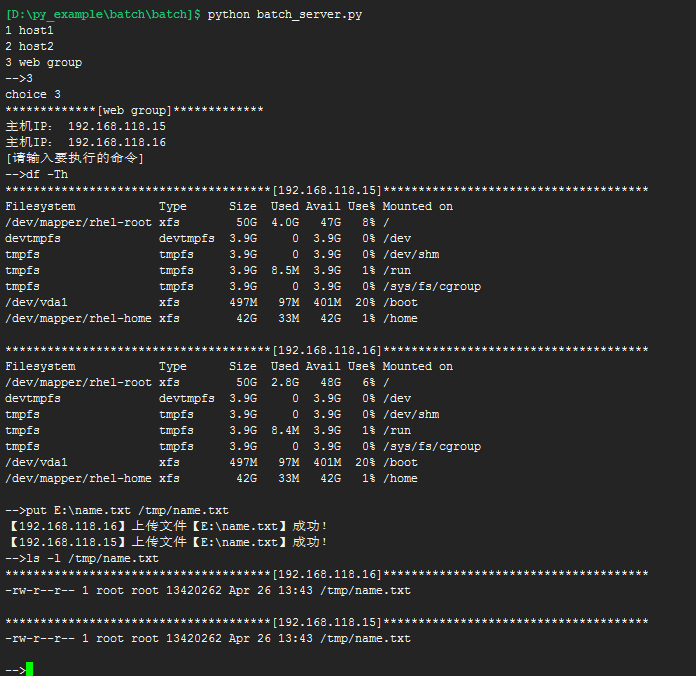[ python ] 项目二:主机批量管理程序
2024-10-21 06:25:58
开发要求:
1. 对主机进行批量管理
2. 可对单台或主机组批量执行命令
3. 可上传文件到对应的主机或组
4. 使用多线程实现
程序:
1. README
# 作者:hkey # 博客地址: # 功能实现:
1. 对主机进行批量管理
2. 可对单台或主机组批量执行命令
3. 可上传文件到对应的主机或组
4. 使用多线程实现 # 目录结构: batch/
├── batch_server.py # 启动程序
├── conf/ # 配置文件目录
│ ├── hosts.ini # 主机信息配置文件
│ └── settings.py # 程序配置文件
└── modules/ # 核心模块
├── batch_hosts.py # 主机信息模块
└── execute.py # 执行命令模块 # 使用说明: 通过序号选择主机或组,'q'表示返回上一级;
README
2. 程序结构

3. 程序代码
启动程序:
#!/usr/bin/env python
# -*- coding:utf-8 -*-
import os, configparser
from conf import settings
from modules import execute
from modules import batch_hosts
from multiprocessing import Process
import threading configfile = settings.configfile
conf = configparser.ConfigParser()
conf.read(configfile) config = batch_hosts.Config(conf, configfile)
if not os.path.isfile(configfile):
config.create_conf() if __name__ == '__main__':
while True:
for index, item in enumerate(conf.sections(), 1): # 循环主机或组信息
print(index, item)
choice = input('-->').strip()
if not choice: continue
if choice == 'q':
break
if choice.isdigit() == False:
print('输入编号错误,请重新输入。')
elif int(choice) > len(conf.sections()) or int(choice) < 1: # 输入的序号不在主机列表内
print('编号不在列表中,请重新输入')
else:
section_host = config.show_host(choice) # 通过choice 作为section索引获取主机信息字典
section_index = int(choice) - 1
print('[%s]'.center(30, '*') % conf.sections()[section_index])
for host in section_host:
print('主机IP:', host['ip'])
print('[请输入要执行的命令]')
while True:
command = input('-->').strip()
if not command: continue
if command == 'q':
break
process_list = []
# 通过多线程运行,每一台主机任务通过一个线程去执行
for host in section_host:
exec_cmd = execute.ExecCommand(host, command)
t = threading.Thread(target=exec_cmd.run,)
t.start() # 并发执行,这里不需要join阻塞
process_list.append(t)
for t in process_list:
t.join()
batch_server.py
conf /
主机信息文件:
[host1]
password = 123456
username = root
ip = 192.168.118.15
port = 22 [host2]
password = 123456
username = root
ip = 192.168.118.16
port = 22 [web group]
group = host1,host2
hosts.ini
程序环境变量配置:
#!/usr/bin/env python
# -*- coding:utf-8 -*-
import sys, os
import configparser # 程序主目录
BASE_DIR = os.path.dirname(os.path.dirname(os.path.abspath(__file__)))
sys.path.insert(0, BASE_DIR) # 配置目录
CONF_DIR = os.path.join(BASE_DIR, r'conf') # 配置文件目录
configfile = os.path.join(CONF_DIR, 'hosts.ini')
settings.py
modules /
主机信息处理模块
#!/usr/bin/env python
# -*- coding:utf-8 -*-
import os
import configparser, paramiko
from conf import settings class Config(object):
'''对配置文件的创建和查看'''
def __init__(self, config, configfile):
self.configfile = configfile
self.config = config
def create_conf(self):
'''创建配置文件'''
self.config['host1'] = {
'ip': '192.168.118.15',
'port': 22,
'username': 'root',
'password': ''
}
self.config['host2'] = {
'ip': '192.168.118.16',
'port': 22,
'username': 'root',
'password': ''
}
self.config['web group'] = {
'group': 'host1,host2'
}
with open(self.configfile, 'w') as file:
self.config.write(file) def show_host(self, choice):
'''获取主机信息字典'''
print('choice', choice)
section_index = int(choice) - 1
section_name = self.config.sections()[section_index]
section = self.config[section_name]
host_data_list = []
if 'group' in section:
host_list = section['group'].split(',')
for host in host_list:
host_data_list.append(self.config[host])
else:
host_data_list.append(section)
return host_data_list
batch_hosts.py
命令执行模块
#!/usr/bin/env python
# -*- coding:utf-8 -*-
import paramiko
import os class ExecCommand(object):
'''执行命令类'''
def __init__(self, host, command):
self.hostname = host['ip']
self.port = int(host['port'])
self.username = host['username']
self.password = host['password']
self.command = command def run(self):
cmd = self.command.split()[0]
if cmd.startswith('put') and hasattr(self, cmd):
func = getattr(self, cmd)
func()
else:
setattr(self, cmd, self.exec_command)
func = getattr(self, cmd)
func() def put(self):
transport = paramiko.Transport(self.hostname, self.port)
transport.connect(username=self.username, password=self.password)
sftp = paramiko.SFTPClient.from_transport(transport)
sftp.put(self.command.split()[1], self.command.split()[2])
transport.close()
print('【%s】上传文件【%s】成功!' % (self.hostname, self.command.split()[1])) def exec_command(self):
self.ssh = paramiko.SSHClient()
self.ssh.set_missing_host_key_policy(paramiko.AutoAddPolicy())
self.ssh.connect(self.hostname, self.port, self.username, self.password)
stdin, stdout, stderr = self.ssh.exec_command(self.command)
res, err = stdout.read(), stderr.read()
result = res if res else err # 三元运算,默认stdout,错误登录 stderr
print('[%s]'.center(80, '*') % self.hostname)
print(result.decode())
execute.py
程序运行如下图:

最新文章
- Node.js之sails框架
- [LeetCode_5] Longest Palindromic Substring
- 利用Unity制作“表”
- java中遇到过的String的一些特性
- 【HDU】3506 Monkey Party
- 【BZOJ】3093: [Fdu校赛2012] A Famous Game
- java中hashCode方法与equals方法的用法总结
- HTTP协议(待完善)
- Redhat 6环境下安装Oracle 12c的方法
- 57.DDR3的系统时钟编译错误
- c#快捷键大全
- hdu 2196
- <php>PDO用法一
- Stbdroid之ShapeDrawable
- mac 下 wget 安装
- HTML基本文件, CSS基础
- 将Chrome插件Momentum背景图片设为桌面壁纸
- mysql5.5.28在Linux下的安装
- WCF 改成 restful api
- ios vue2.0使用html5中的audio标签不能播放音乐
热门文章
- Android <Android应用开发实战> 资源类型<二>
- 洛谷 P3119 [USACO15JAN]草鉴定Grass Cownoisseur 解题报告
- Centos6.5+Python2.7 +ffmpeg+opencv2自动安装脚本
- (第三章,第四章)http报文内的http信息,返回结果的http状态码
- linux shell读取配置文件
- Git 常见工作流
- 【BZOJ】1703: [Usaco2007 Mar]Ranking the Cows 奶牛排名
- NGINX: 配置 HSTS
- es6异步操作
- Python ctypes的byref和pointer有啥区别